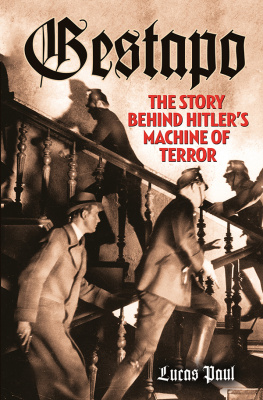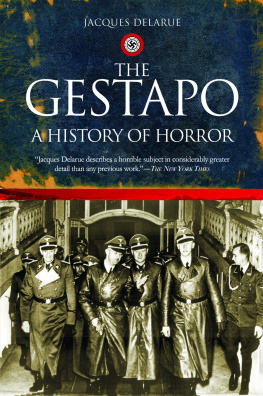How do terror and popularity merge under a dictatorship? How did the Gestapo deal with critics of Nazism? Based on hundreds of secret-police case files, Enemies of the People explores the day-to-day reality of political policing under Hitler. Examining the Gestapos policy of selective enforcement, J. Ryan Stackhouse challenges the abiding perception of the Gestapo as policing exclusively through terror. Instead, he reveals the complex system of enforcement that defined the relationship between state and society in the Third Reich and helps to explain the Germans abiding support for Hitler and their complicity in the regimes crimes. Stories of everyday life in Nazi Germany paint the clearest picture yet of just how differently the Gestapo handled certain groups and actions, and the routine investigation, interrogation, and enforcement practices behind this system. Enemies of the People offers penetrating insights into just how reasonable selective enforcement appeared to Germans, and draws unavoidable parallels with the contemporary threat of authoritarianism.
J. Ryan Stackhouse is a historian of modern Europe and Nazism. As a Walbolt Fellow, his Ph.D. from Florida State University was honoured with Distinction. Ryan hosts The Third Reich History Podcast, and interviews experts about the many faces of authoritarianism on the New Books Network.
J. Ryan Stackhouse
University Printing House, Cambridge CB2 8BS, United Kingdom
One Liberty Plaza, 20th Floor, New York, NY 10006, USA
477 Williamstown Road, Port Melbourne, VIC 3207, Australia
314321, 3rd Floor, Plot 3, Splendor Forum, Jasola District Centre, New Delhi 110025, India
103 Penang Road, #0506/07, Visioncrest Commercial, Singapore 238467
Cambridge University Press is part of the University of Cambridge.
It furthers the Universitys mission by disseminating knowledge in the pursuit of education, learning, and research at the highest international levels of excellence.
www.cambridge.org
Information on this title: www.cambridge.org/9781108832601
DOI: 10.1017/9781108961677
J. Ryan Stackhouse 2021
Epigraph from God in the Dock by CS Lewis copyright CS Lewis Pte Ltd 1970. Used with permission.
This publication is in copyright. Subject to statutory exception and to the provisions of relevant collective licensing agreements, no reproduction of any part may take place without the written permission of Cambridge University Press.
First published 2021
Printed in the United Kingdom by TJ Books Limited, Padstow Cornwall
A catalogue record for this publication is available from the British Library.
Library of Congress Cataloging-in-Publication Data
Names: Stackhouse, J. Ryan, 1985- author.
Title: Enemies of the people : Hitlers critics and the Gestapo / J. Ryan Stackhouse.
Description: Cambridge ; New York, NY : Cambridge University Press, 2021. | Includes bibliographical references and index.
Identifiers: LCCN 2020049624 (print) | LCCN 2020049625 (ebook) | ISBN 9781108832601 (hardback) | ISBN 9781108959674 (paperback) | ISBN 9781108961677 (epub)
Subjects: LCSH: Germany. Geheime StaatspolizeiHistory. | Secret serviceGermanyHistory20th century. | NazisGermany. | Government, Resistance toGermanyHistory20th century. | DissentersGermanySocial conditions20th century. | Political cultureGermanyHistory20th century. | AuthoritarianismGermanyHistory20th century. | GermanyPolitics and government1933-1945.
Classification: LCC HV8207 .S723 2021 (print) | LCC HV8207 (ebook) | DDC 363.28/3094309043dc23
LC record available at https://lccn.loc.gov/2020049624
LC ebook record available at https://lccn.loc.gov/2020049625
ISBN 978-1-108-83260-1 Hardback
Cambridge University Press has no responsibility for the persistence or accuracy of URLs for external or third-party internet websites referred to in this publication and does not guarantee that any content on such websites is, or will remain, accurate or appropriate.
For Mom and Dad. We stand on the shoulders of giants.
Contents
Figures
Tables
Preface
When I started researching this book, it never occurred to me that the past would confront me in the headlines. I was a child of the nineties. My first political memory is of investigating the noise downstairs to find dad standing in front of the television as images flashed of revelers dancing atop the Berlin Wall. He excitedly waved me to his side and began to explain the significance of what we were witnessing as he gesticulated wildly toward the screen. I dont remember what he said. But I knew it must have been important for him to be home during the afternoon. The people on the screen were happy though. How the times have changed.
I started researching the Third Reich because I wanted to know why people supported Nazism. The draw of Hitlers spectacular charisma and economic recovery after the Great Depression had always made sense to me. So too did the scapegoating of minorities and fear of communist revolution. But I could never square the circle with terror. Why would people support a regime that threatened their lives?
The headlines remind us that authoritarian populists draw a line between us and them. We are good. They are evil. A threat to our very way of life. We only belong to us if we remain loyal to the tribe. But it is hard to imagine being shut out of that community. Especially when we are constantly reminded that they are different. All we must do is behave to be rewarded. The terror protects us from them.
This is a book about how popular authoritarian regimes remain legitimate. It is a book about how systems enact ideas. It is a book about how genocide and political persecution become possible. It has become a book about dynamics at work in the world today.
Acknowledgements
The most satisfying part of any project is celebrating its completion with everyone who helped along the way. A book some ten years in the making involves so many people over such a long time that I can only beg forgiveness from anyone I forget.
Some provided inspiration that planted a seed. Mary Anne Cressman fostered a love of reading, while Chris Kirkness continues to nourish what grew into an insatiable appetite for books that bring history to life. Great teachers cultivated those interests. Vic MacFarlane saw to it that we bore witness to the Holocaust. Bruce Fisher showed us the connections to the present day. Chris Brown shared both his considerable library and wit on the hunt for understanding. Beth MacMichael pushed me one step further with a first taste of teaching. She now tweets stoic philosophy. Leo MacKay built an oasis where we could play with words and find our voices. After Truro, there was Acadia, where Arndt Kruger, Christian Thomas, Thomas Voss, and Uwe Wilhelm cultivated a newfound appreciation of German culture. And from Acadia to Guelph, where Peter Goddards methodology course remains one of the turning points in my life.
Others opened their homes and hearts in pursuit of knowledge. John Burke introduced me to the men whose stories convinced me to become an historian. Philipp Spalek gave the gift of language and an understanding of the two Germanies that changed everything. His perspective opened the world to me through new eyes. Christian Gropp and his magnificent beard introduced me to the Rhineland over winding conversations about archival science and the state of the world. A foreign land can be a lonely place, but thanks to their friendship, Germany will always be a home away from home. The Gentlemen of Salmon Lake continue to be a source of intellectual inspiration and moral clarity in an ever-changing world. Guelphs Eighth Floor stands as testament to what can happen when institutions remember that they exist to bring people together and set aside space to share ideas. In all my travels, I have yet to find a finer community of scholars. Dan Zylberkan, Jonathan Deverse, Matt Burkhalter, and Witt Callaway were right there through thick and thin in Florida. Nothing quite drives a project forward like living with friends sharing the same struggles and asking the same kinds of questions from very different perspectives. Aaron Ducker and Weston Nunn were always game to bounce around ideas. Robert Watkins and Claire Cotton quite literally peeled me off the street and helped me get back to work after being run down by a pickup truck. David Thompson has continued to encourage the endeavour with his shared enthusiasm for a good war story and an even better yarn. Colleagues became friends, and friends became colleagues along the way.












